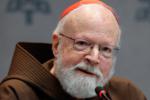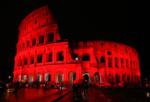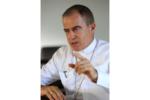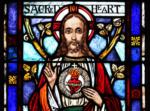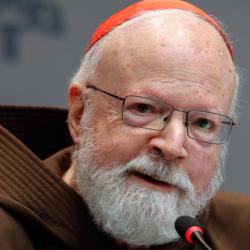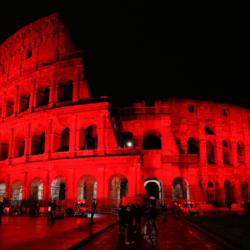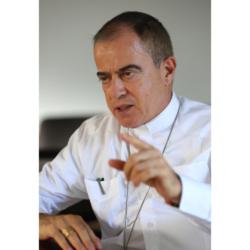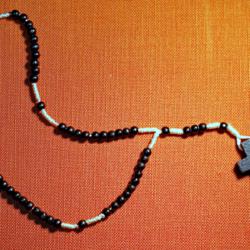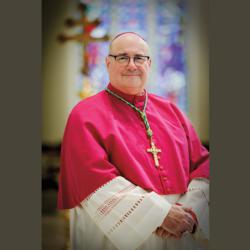Tens of thousands flood Indianapolis streets for largest U.S. Eucharistic procession in decades
INDIANAPOLIS (OSV News) -- Tens of thousands of Catholics walked through the streets of downtown Indianapolis July 20 for what Bishop Andrew H. Cozzens said "might be the largest Eucharistic procession in the country in decades." But, in prayer during adoration at the Indiana World War Memorial Plaza, the bishop of Crookston, Minnesota, also said their immense numbers were still "too small."
"There are millions of people in our own states, in our dioceses, who don't yet know you," said Bishop Cozzens, board chairman of the National Eucharistic Congress Inc. In his prayer, he encouraged the throngs of people kneeling in the Indiana World War Memorial Plaza to be missionaries to those who need to be brought to Jesus.
Along with Indianapolis Archbishop Charles C. Thompson, Bishop Cozzens had accompanied the Eucharist on a truck-pulled float, kneeling before the gleaming monstrance.
Thousands had processed behind the flower-rimmed float, slowly making their way across 10 city blocks from the Indiana Convention Center to the Indiana World War Memorial. Others lined the streets, kneeling as the Eucharist passed by.
The procession was a much-anticipated highlight of the 10th National Eucharistic Congress held July 17-21 at the convention center and Lucas Oil Stadium. More than 50,000 passes were sold for the congress -- the first national Eucharistic congress in 83 years -- but organizers expected the procession to draw from beyond the congress's registered participants.
The float was preceded by hundreds of seminarians, religious sisters and brothers, deacons, an estimated 1,000 priests and more than 100 bishops and cardinals -- including Cardinal Christophe Pierre, the U.S. papal nuncio, and Cardinal Luis Antonio Tagle, Pope Francis' special envoy to the congress.
At the very front were children, dressed in white dresses and suits, who had recently received their first Communion. They carried baskets of rose petals, spreading them on the ground ahead of the Eucharist.
Immediately following the Eucharistic float, leading music, were a few of the "perpetual pilgrims" who had recently finished the National Eucharistic Pilgrimage, an eight-week journey from four compass points of the United States with the Eucharist that culminated at the congress.
Walking with them in the Indianapolis procession was Will Peterson, whose nonprofit Modern Catholic Pilgrim had organized the pilgrimage. Behind them were Knights of Columbus, knights and dames of the Order of the Holy Sepulchre, walking closely together, and other perpetual pilgrims from the national pilgrimage. The procession also included Catholic dancers reflecting their cultural traditions.
As the Eucharistic float pulled away from the conference center along Capitol Avenue, in the shadow of St. John the Evangelist Catholic Church -- the site of the congress's perpetual adoration chapel -- and under a skyway emblazoned with the words "These Roads Lead to Revival," a crush of people left the sidewalks to walk behind the Lord.
The float turned right down Maryland Street and then left on Meridian Street, a central Indianapolis corridor, passing storefronts, office buildings and restaurants, and curving around the Monument Circle roundabout. When it arrived at the Indiana World War Memorial Plaza, Bishop Thompson and Bishop Cozzens disembarked.
Bishop Cozzens processed with the monstrance, followed by Bishop Thompson, toward a stage at the base of the memorial, where musicians were singing the Divine Mercy Chaplet. When they reached the stage and its temporary altar, they secured the monstrance in its base for adoration and knelt before Jesus in the Eucharist.
As people made their way into the park, many knelt on the grass or the sidewalks as a soprano sang "Let All Mortal Flesh Keep Silent." With the hot July sun beating down on the pavement, people knelt, wept or raised their arms, or simply sat and contemplated the Blessed Sacrament.
After another hymn, Bishop Cozzens read from Matthew 13: "Blessed are your eyes, because they see, and your ears, because they hear. Amen, I say to you, many prophets and righteous people longed to see what you see but did not see it, and to hear what you hear but did not hear it."
Kneeling before the Eucharist, he prayed, "Jesus we know the procession we made today is a symbol, a sign of our earthly pilgrimage, and it's not over. ... We know that you want all people to follow you. Jesus, we will walk with them. Jesus, bring them to us. We want to walk with them towards you, Jesus."
He continued: "Jesus we have experienced in these days together just a small taste of heaven. Show us, Lord, who you are. ... Make us, Lord, your missionaries to every corner of our land."Bishop Cozzens' six-minute prayer led into adoration with praise and worship music, the song's refrain simply a repetition of "Jesus."
After Benediction, the Eucharist's repose and the final stirring chords of "Holy God, We Praise Thy Name," someone shouted, "Viva Cristo Rey!" ("Long Live Christ the King!") -- to which the multitude gave a loud shout of "Viva!" People began dispersing well after 5 p.m., with most making their way to Lucas Oil Stadium for the congress's 7-10 p.m. final nightly revival session, which was to feature Bishop Robert E. Barron of Winona-Rochester, Minnesota, and the Word on Fire apostolate; speaker and podcast host Gloria Purvis; actor Jonathan Roumie, who portrays Jesus in "The Chosen" miniseries; and musician Matt Maher.
Participants marveled at the procession's size and meaning, both for them personally, and for the wider church in the U.S.
During adoration, tears filled the eyes of Irene Mantilla, an immigrant from Peru now living in Chicago. The 60-year-old said she recalled God "parting the Red Sea" of difficulties in her life and accompanying her. "And I'm still walking," she said.
Father Roger Landry, a Columbia University chaplain who had traveled the full length of the National Eucharistic Pilgrimage's Seton Route from New Haven, Connecticut to Indianapolis, said the procession was "by far the greatest one that the country has had since before World War II."
"I was so happy that the Eucharistic congress and the Eucharistic pilgrimage featured this extraordinary Eucharistic procession," he said. "And that we all had the privilege to be able to walk with Jesus and tens of thousands of others, thanking him for never abandoning us and always walking with us through life.
He was also grateful for this tremendous witness to proclaim to Indianapolis and the entire U.S. "what the nature of the Christian life is."
"It's a journey with Jesus, not here to Indianapolis, but to heaven," Father Landry said.
Theresa and Craig Gilley from Alabama had arrived early at the Indiana World War Memorial Plaza, and said that it was Jesus alone who had brought them to Indianapolis and to the procession.
"I've thought to myself, you know, you can see him in any church on any corner, but there's something about all of us getting together that is really cool, especially being from the South where there's not really a lot of us (Catholics)," Theresa Gilley said.
"It's really exciting to be able to show not just the city of Indianapolis, but the whole country what Catholics really think and really believe," Craig Gilley added.
Among the first communicants leading the procession was Elaine Saunee, with her mother, Melanie Saunee, of Destrehan, Louisiana. Elaine Saunee received her first Communion 14 weeks ago and was excited to be in the procession, wearing her first Communion dress and a veil crafted from her mother's wedding veil.
"To be able to walk with him (Jesus) in procession and to witness to the rest of the country is a desire you have as a parent, to bring witness to their faith," Melanie Saunee said, her voice filling with emotion.
Frederick Williams, a seminarian with the Diocese of Savannah, Georgia, described the procession as "such an incredible opportunity."
"You know, going into it, I was kind of skeptical," he admitted. "My feet were hurting from walking all week already. But, you know, as soon as I sort of gathered with my brother seminarians here, seeing the immensity of them, seeing them, the bishops gathered, the priests, the deacons, the lay faithful, the religious sisters, I could not think about my feet that were hurting this entire time."
"All I could think of was just my heart overflowing with love of the church," he said.
Jeremy Schaefer, a seminarian from the Diocese of Cleveland, said the atmosphere was "truly electric."
"It's been an amazing week so far, and this is quite the capstone for the entire week," he said, calling it "a highlight of my seminary formation and I'm sure a highlight of my entire life in general."
Dave Baudry from the Archdiocese of Milwaukee said he was at the beginning of the procession and was touched to see the amount of people there, especially the kids praying on the sidewalk and the sheer number of priests and sisters walking with the Eucharist.
He described people locking arms together, singing, praying the rosary and reflecting, even people "in tears, crying, as we went by."
"It was the biggest thing I ever experienced in my 45 years of ministry," he said.
Beth Schuele of Warren, Michigan, and a volunteer and trainer with St. Paul Street Evangelization, spoke to OSV News as she stood with her "mobile evangelization unit" -- a wagon with prayer cards and a prayer sign -- at the edge of the war memorial as thousands processed by.
"I think it's beautiful," she said about the procession. "The big witness of what it is, that Jesus is really truly present, is powerful."
Susan Holtsclaw from the Archdiocese of St. Louis, said she and her husband, Greg, were impressed to see "many thousands of people in the street just to wait for Jesus to go by."
"To see him walk through the streets with thousands of people there worshiping and ... know he's there and that he's always with us" was a gift, said Greg Holtsclaw.
The Holtsclaws had never before seen a procession of this magnitude.
"It's unbelievable to see so many people here, all of us worshiping, you know, God and our Savior," Greg Holtsclaw said.
After the "amazing" procession and all they have experienced at the congress, they are looking forward to sharing their experience with people at home, he said, and "spread the love that we felt here."
- - - Maria Wiering is senior writer for OSV News. Contributing to this story were Julie Asher, Maria-Pia Negro Chin, Gina Christian and Gretchen R. Crowe.



